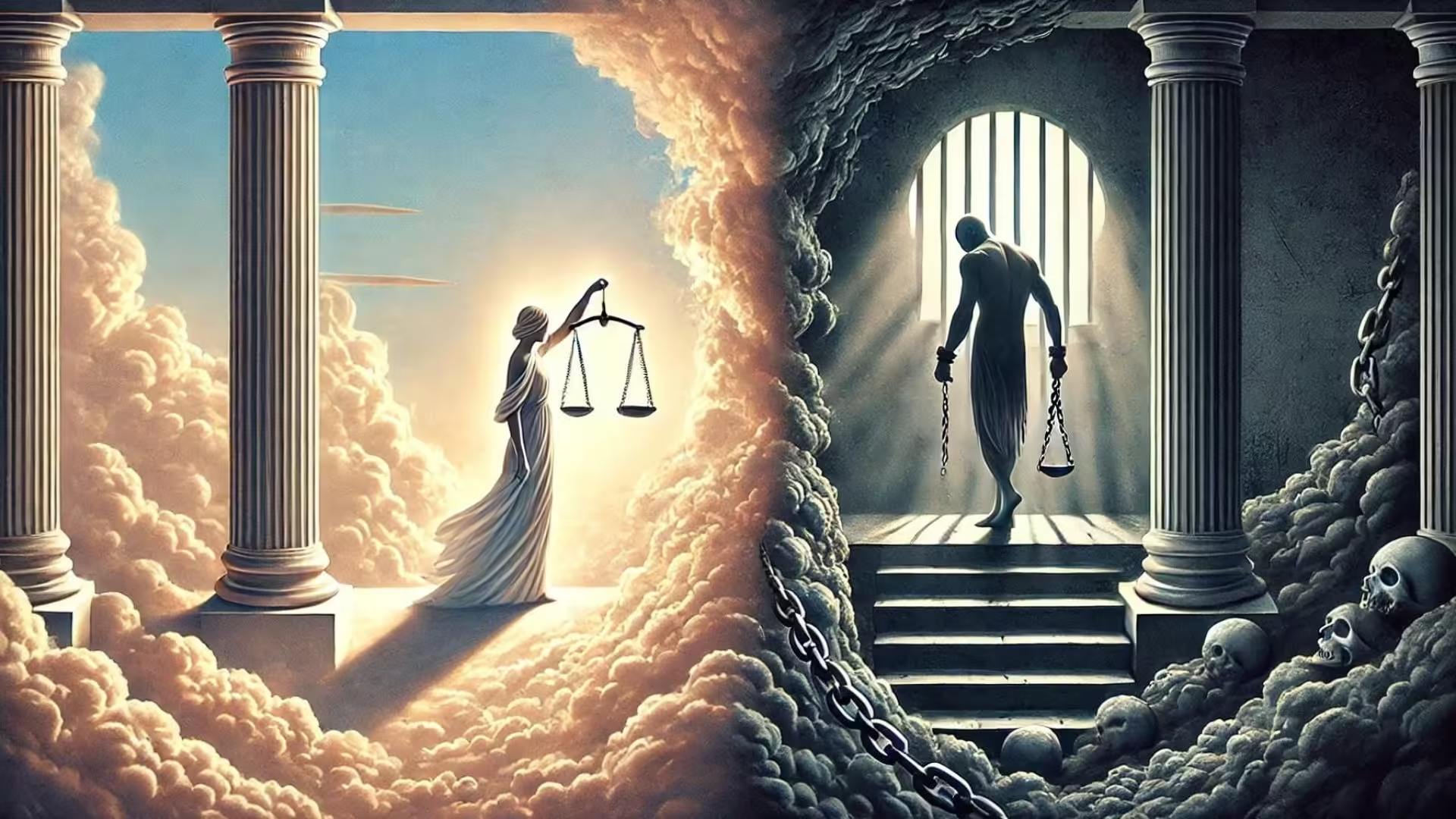- Did You Know That the Just-World Hypothesis is Why Some People Believe Victims Must Have Done Something to “Deserve” Their Fate?
- What is the Just-World Hypothesis?
- How the Just-World Hypothesis Leads to Victim-Blaming
- Why Do People Believe in a Just World?
- When the Just-World Hypothesis is Inappropriate
- Challenging the Just-World Hypothesis
- Understanding the World Beyond Simple Justice
- Expand Your Vocabulary
- Let’s Talk
Did You Know That the Just-World Hypothesis is Why Some People Believe Victims Must Have Done Something to “Deserve” Their Fate?
We’ve all heard someone say, “They must have done something to deserve it,” when discussing a tragic event or an unjust situation. This belief stems from a psychological concept called the just-world hypothesis. It’s the idea that people get what they deserve, and the world is inherently fair. While this mindset can provide a sense of control and order in the world, it can also lead to harmful victim-blaming. Let’s explore how the just-world hypothesis works and why it influences our perception of justice.
What is the Just-World Hypothesis?
The just-world hypothesis is a cognitive bias that leads people to believe the world is just and that individuals get what they deserve. This psychological theory was first introduced by social psychologist Melvin Lerner in the 1960s. According to this theory, people want to believe that good things happen to good people and bad things happen to bad people. This belief offers comfort because it suggests that if we live good, moral lives, we will be rewarded, and if something bad happens, the person must have done something to warrant their misfortune.
How the Just-World Hypothesis Leads to Victim-Blaming
One of the most significant consequences of the just-world hypothesis is victim-blaming. When we hear about someone facing hardship or tragedy, such as being a victim of crime, illness, or poverty, this bias can prompt us to search for reasons why they are to blame for their situation. People who adhere to the just-world hypothesis might unconsciously think, “There must be something they did to cause this.”
Example:
- After hearing about a person losing their job, someone influenced by the just-world hypothesis might assume, “They must have been a bad employee,” rather than considering external factors like layoffs or an economic downturn.
Example:
- In cases of sexual assault, people may ask questions like, “What were they wearing?” or “Why were they out so late?” These questions shift the blame from the perpetrator to the victim, based on the misguided belief that victims somehow invite their own suffering.
Why Do People Believe in a Just World?
The just-world hypothesis arises from a desire for control and predictability. The world can be chaotic and random, filled with events that seem unfair or unjust. By believing in a just world, people feel safer because they think that if they follow the rules and behave ethically, they can avoid misfortune. This cognitive bias helps maintain psychological stability, but it comes at a cost—it oversimplifies complex issues and overlooks the true causes of suffering.
Example:
- “If I work hard and follow the rules, I’ll be successful and avoid bad luck.” This belief offers reassurance, but it ignores factors like systemic inequality or unexpected life challenges that can disrupt even the best-laid plans.
When the Just-World Hypothesis is Inappropriate
While it’s natural to seek fairness in the world, the just-world hypothesis becomes problematic when it leads to unfair judgment of others. Blaming victims for their misfortune prevents empathy and understanding. In many cases, bad things happen to people for reasons beyond their control, such as accidents, natural disasters, or systemic inequalities.
Example:
- When a person is diagnosed with a serious illness, they may face stigma because of the belief that their lifestyle choices must have contributed to the disease. This thinking ignores genetic factors or environmental influences that are out of the person’s control.
Challenging the Just-World Hypothesis
Recognizing the influence of the just-world hypothesis can help combat its harmful effects. It’s essential to approach situations with empathy and understanding rather than judgment. Instead of assuming that people “deserve” their fate, we can acknowledge that life is complex and that many factors contribute to a person’s circumstances.
Example:
- In the case of homelessness, instead of blaming individuals for their situation, we can consider the broader societal issues, such as the lack of affordable housing, mental health support, or job opportunities.
Understanding the World Beyond Simple Justice
The just-world hypothesis reflects a desire to believe in a fair and predictable world, but it can distort our perception of reality. By fostering a deeper understanding of how this cognitive bias influences our thinking, we can move toward a more empathetic and compassionate society. When faced with the suffering of others, instead of asking, “What did they do to deserve this?” we can ask, “How can I help?”
Now that you understand the just-world hypothesis, consider how it might influence your own thinking. The next time you hear about someone facing misfortune, pause and reflect on whether you are placing unfair blame on the victim. What steps can you take to cultivate greater empathy and understanding in your everyday interactions?
Expand Your Vocabulary
- Just-World Hypothesis
Meaning: A cognitive bias where people believe the world is fair and individuals get what they deserve.
Context: “The just-world hypothesis explains why people sometimes blame victims for their own misfortunes.”
Everyday Use: You might hear this term in psychology or social discussions. For example, “The just-world hypothesis makes it difficult for people to acknowledge systemic injustice.” - Cognitive Bias
Meaning: A systematic pattern of deviation from rational judgment, where people make decisions based on subjective experiences.
Context: “The just-world hypothesis is a cognitive bias that makes people believe the world is inherently fair.”
Everyday Use: You can use “cognitive bias” when talking about how people’s thinking is influenced by preconceived notions, like “Confirmation bias is a cognitive bias where people only seek information that supports their beliefs.” - Victim-Blaming
Meaning: Holding the victim of a crime or tragedy responsible for what happened to them.
Context: “One of the most harmful effects of the just-world hypothesis is victim-blaming.”
Everyday Use: This term is often used in discussions of justice, especially in cases of assault or discrimination. For instance, “The media coverage focused on victim-blaming, asking why the woman was walking alone at night.” - Unconsciously
Meaning: Doing something without being aware of it.
Context: “People unconsciously think that the victim must have done something to cause their misfortune.”
Everyday Use: You might say, “He unconsciously taps his foot when he’s nervous,” referring to actions done without deliberate intention. - Empathy
Meaning: The ability to understand and share the feelings of another.
Context: “Blaming victims prevents empathy and understanding of their true struggles.”
Everyday Use: “Empathy” is often discussed in terms of personal relationships, such as “Showing empathy is crucial in helping friends through tough times.” - Judgment
Meaning: The ability to make considered decisions or come to sensible conclusions.
Context: “The just-world hypothesis can lead to unfair judgment of others in difficult situations.”
Everyday Use: You might use it in everyday language like, “It’s important to withhold judgment until you know all the facts.” - Stigma
Meaning: A mark of disgrace or negative stereotype associated with a particular circumstance or quality.
Context: “Illnesses often come with stigma, as people may believe that the individual’s choices led to their condition.”
Everyday Use: “Stigma” is commonly used when talking about issues like mental health, such as “We need to break the stigma surrounding depression.” - Misfortune
Meaning: Bad luck or an unfortunate condition.
Context: “The just-world hypothesis makes people assume that victims are responsible for their misfortune.”
Everyday Use: You could say, “Despite all his hard work, he faced a lot of misfortune when his business failed.” - Ethically
Meaning: In a morally correct manner.
Context: “People want to believe that if they live ethically, they can avoid bad things happening to them.”
Everyday Use: “Ethically” is often used in discussions about moral decisions, like “She chose to act ethically, even when it was the harder option.” - Systemic Inequality
Meaning: Disparities in income, rights, and access to resources that are deeply rooted in the structure of society.
Context: “The just-world hypothesis can prevent people from seeing issues like systemic inequality.”
Everyday Use: You might hear it in political or social contexts, such as “Systemic inequality often affects access to education and healthcare.”
Let’s Talk
Here are some thought-provoking questions based on the just-world hypothesis to encourage reflection and conversation. You can think about them yourself, discuss them with friends and family, or even share your responses in the comments:
- Have you ever caught yourself assuming that someone’s misfortune was their own fault? How did learning about the just-world hypothesis change the way you think about these situations?
- How do you think the belief in a just world influences the way society responds to victims of crime, poverty, or illness? Does this belief make it harder to offer help or show empathy?
- Can you think of any real-life situations where the just-world hypothesis led to unfair victim-blaming? How could more understanding and empathy have changed the outcome of that situation?
- Do you believe the just-world hypothesis plays a role in how people view success and failure? How might this mindset influence attitudes toward wealth, privilege, or personal achievements?
- What are some practical steps we can take to challenge the just-world hypothesis in our everyday lives? How can we shift from judgment to empathy when encountering someone in a difficult situation?
These questions are meant to spark meaningful discussion and help deepen your understanding of the complex ways we perceive fairness, justice, and empathy in the world. Feel free to share your thoughts and engage in the conversation!











0 Comments